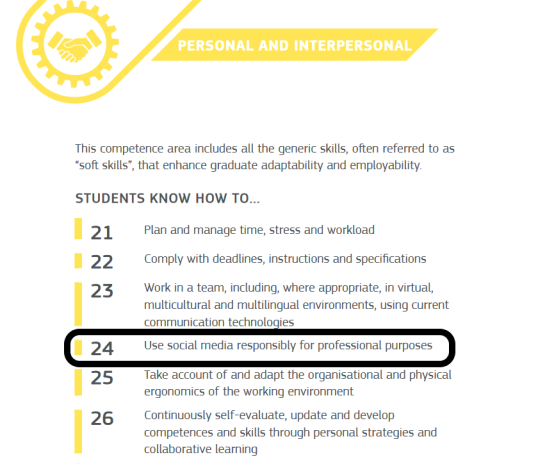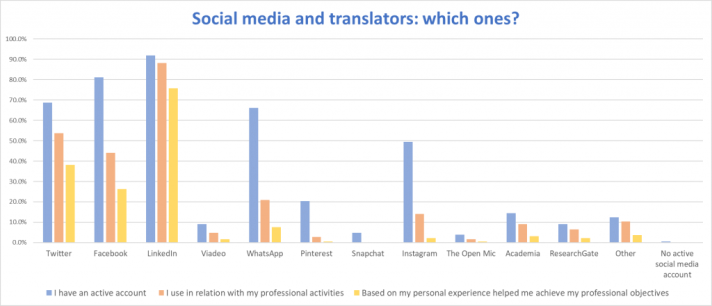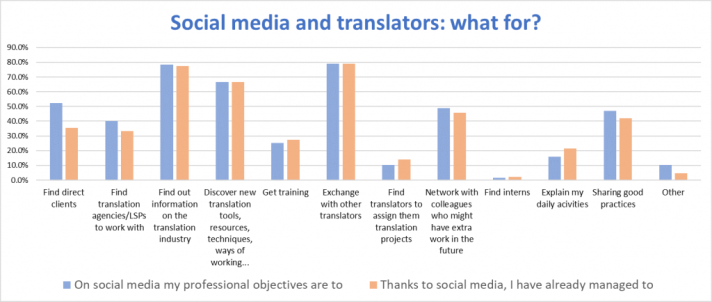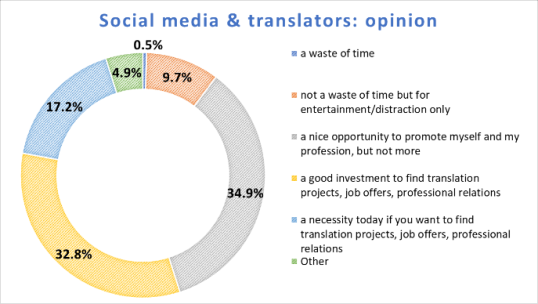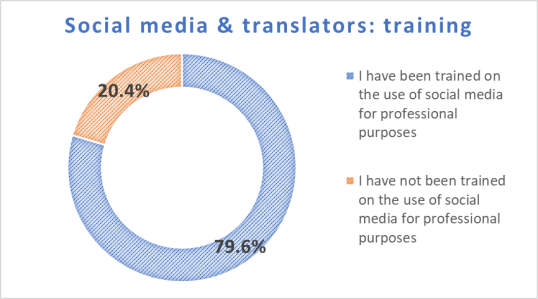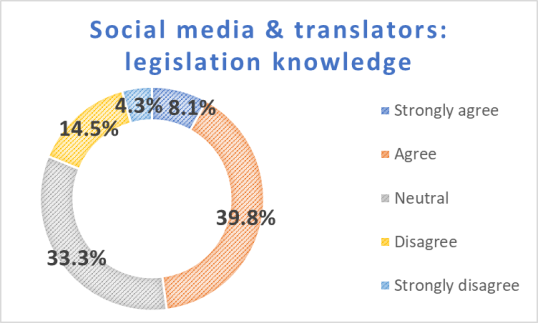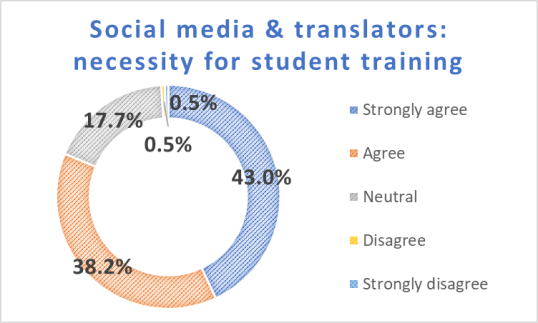
Social Media Marketing Strategy, by https://todaytesting.com under CC BY 4.0
When the new European Master’s in Translation reference framework, published in 2017, was in preparation, some discussion took place on the necessity to include competence #24, “Use social media responsibly for professional purposes” in the “Personal and Interpersonal” competence area. Some colleagues thought this was absolutely essential in the 21st century, while some others thought you could be an excellent professional in the translation industry without ever having a social media account. The latter opinion is certainly valid, but one of the main arguments of those in favour of including competence #24 was that translators, in particular freelance translators, were a very active community on social media, and that knowing how to use social media with professional objectives could definitely be an asset on the translation market, hence the need for specific training in translation programmes. Professionals regularly provide advice on how to use social media effectively (see e.g. Nicolas Adams’s The Little Book of Social Media Marketing for Translators: Network – Learn – Profit, available online, or blog posts like this one). Also, Translation Studies scholars have recently been studying the subject, as illustrated by Renée Desjardins’s book published in 2017, Translation and Social Media: In Theory, in Training and in Professional Practice.
In order to assess the importance of social media training for translation programmes, the presence of professional translators on social media required investigating. If we want students to understand why it is important to be active on social media, and what can actually be gained from this activity, we need to tell them who is actually present on the different social media platforms, what for, and what kinds of opportunities professionals can actually benefit from. To answer these questions, a survey was conducted online in spring 2020 (via, wait for it… social media). This blog post provides the detailed results and some discussion.
Who answered the survey?
The survey entitled “Social media and translators” was published online in April 2020 via a Google Forms questionnaire that contained 14 questions. Answers were completely anonymous and no personal details were requested. The survey was circulated via social media (LinkedIn and Twitter). The survey was available for one month and 188 responses were collected.
The vast majority of respondents are freelance translators (81.7%), with 8.6% private agency/company employees and 5.9 % public-sector employees. Most of them are based in Europe (85.4 %), with 8.1 % in North America, 2.7 % in South America, 1.6 % in Asia, and 1.1 % in both Africa and Australia. The geographical bias is probably due to the LinkedIn and Twitter accounts used to circulate the survey initially. Most respondents are aged 26-39 years old (39.8 %) or 40-54 years old (38.7 %), while only 15.6 % and 5.9 % are older than 55 and younger than 25 respectively. In addition to social media, 41.4 % also have a professional website but 43 % have neither a professional website nor a blog, meaning that social media are their only presence on the web. Only a minority have both a blog and a professional website (11.3 %).
Which social media?
There are many social media out there, some of them definitely professional (e.g. LinkedIn, Viadeo) and some others sometimes considered to be for entertainment only (e.g. Facebook, Twitter, Instagram, WhatsApp[i]). None of them, except for The Open Mic, are specific to (freelance) translators and interpreters. It was therefore interesting to see on which social media translators are present, which ones were chosen in order to achieve professional objectives, and also which ones are actually helpful for them do so. The graph below sums up the results. The top 5 social media used actively by translators are: LinkedIn (91.9 %), Facebook (81.2 %), Twitter (68.8 %), WhatsApp (66.1 %), and Instagram (49.5 %). With professional objectives, the results are the same, albeit with lower percentages, and not in the same order: 88.2 % of translators use LinkedIn professionally, Twitter ranks second with 53.8 % while Facebook is only used professionally by 44.1 % of translators (this represents only half of translators with a Facebook account). In 4th and 5th position, we find WhatsApp (21 %) and Instagram (14 %), which may be a bit surprising, but clearly shows that translators maintain a professional presence on many different social media. In total, the respondents to our survey have 4.3 active social media accounts.
When asked which social media actually helped them achieve their professional objectives, results are only slightly different: while LinkedIn still ranks first with 75.8%, Twitter second with 38.2 %, Facebook third with 26.3 %, WhatsApp now ranks fourth with 7.5 %, and, quite surprisingly, Academia, a private platform for academics, ranks fifth with 3.2 % claiming the website allows them to achieve their personal objectives (while many academics actually argue against the use of the social website, see for instance here or here). This might come as a surprise, as it is often claimed that professionals are disconnected from academic research in linguistics or Translation Studies.
For Facebook, Twitter, and even LinkedIn, we note a discrepancy between all users of social media and the proportion who claim that they have benefited from them professionally, which suggests that not all translators benefit from their online presence.
Note that about 10% of respondents have also mentioned other social media, in particular Xing, considered to be LinkedIn’s German rival. Other marginal answers are ProZ and TranslatorsCafé.
What for?
Professional translators use social media for many different reasons. Exchanging with other colleagues (79 %), finding out information (78.5 %) and what’s new in the industry (66.7 %), seem to be the priorities. Finding clients, whether direct clients (52.2 %) or agencies/LSPs to work with (40.3 %), actually ranks lower. Only rarely do translators use social media to find colleagues to assign them translation projects (10.2 %) or find interns (1.7 %), but this is probably due to the fact that the vast majority of our respondents are freelance translators (81.7 %). Finally, we can see that one quarter of translators go to social media to get training and 16 % of them to share their daily activities with other members of the community. In the category ‘Other’, respondents have mentioned reporting on conferences, finding information on their speciality field, discussing terminology, or self-promotion of their publications.
In general, there is quite a strong correspondence between expectations (‘my professional objectives are to’) and results (‘I have already managed to’), with the exception of using social media to find work (direct clients and agencies/LSPs to work with). Note that seven respondents (3.7 %) have specified that social media have actually never helped them achieve professional objectives, and one responded that this was the case only to a certain extent.
On average, most professional translators spend between 5 and 10 hours per week on social media, and have the feeling that such an investment is useful, but only to some extent: while only 0.5% of them consider social media to be a waste of time, 34.9 % consider them to be a nice opportunity but not more, while a similar proportion (32.8 %) go further and think they are a good investment for their career. Only 17.2 % consider their presence on social media to be a necessity.
Most of our respondents have not been trained on the use of social media for professional purposes (79.6 %), and less than half of them (47.9 %) agree or strongly agree that they know enough about the legislation on the professional use of social media (confidentiality, intellectual property, integrity...), with 33.3 % of respondents neither agreeing nor disagreeing. Unsurprisingly, 81.2 % of them agree or strongly agree that specific training should be provided to students on the professional use of social media, with only 1 % (strongly) disagreeing.
Conclusion
Our survey shows that social media clearly have found their place in professional translators’ daily lives, with an average of 4.3 social media accounts per professional and at least 5 hours of online presence for most of them. In the light of what can be achieved thanks to such online activity, in particular in terms of information related to the translation industry and technological developments, it seems fair to consider that professionals-to-be should be trained on the use of social media with professional objectives. The presence of competence #24, “Use social media responsibly for professional purposes”, in the EMT’s reference framework, thus seems justified.
References
Adams, Nicole Y. 2013. The Little Book of Social Media Marketing for Translators: Network – Learn – Profit. North Charleston, SC, United States: CreateSpace Independent Publishing Platform. Available online.
Desjardins, Renée. 2017. Translation and Social Media: In Theory, in Training and in Professional Practice. London: Palgrave.
Grassili, Chiara. 2015. The Ultimate Guide to Social Media for Translators. Blog post on A Translator’s Thoughts, https://translatorthoughts.com/2015/10/social-media-for-translators/.
I would like to thank the 188 respondents who took the time to answer the online survey. My thanks also go to Charles Eddy, who proofread the questionnaire, and Joss Moorkens, who proofread the blog post.
[i] There might be some debate about the status of WhatsApp: social media or messaging platform? It seems there is no consensus about this, with arguments against or in favour of considering WhatsApp a social media platform, but we decided to include it in our questionnaire.
Details
- Publication date
- 1 July 2020
- Language
- Dutch
- English
- French
- Italian
- Latvian
- EMT Category
- Translation competences

